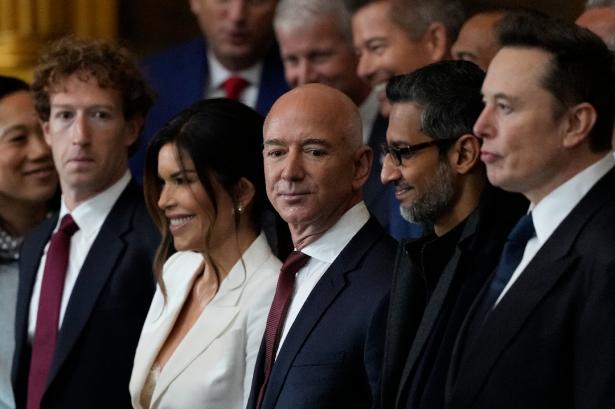Joe Biden said, in his farewell address:
I want to warn the country of some things that give me great concern. And that’s the dangerous concentration of power in the hands of very few ultra-wealthy people, and the dangerous consequences if their abuse of power is left unchecked. Today an oligarchy is taking shape in America of extreme wealth, power, and influence that literally threatens our entire democracy, our basic rights and freedoms, and a fair shot for everyone to get ahead.
Biden’s parting comments have been hailed among liberals and leftists alike for its rare acknowledgment of oligarchy in the United States; Bernie Sanders, for example, praised him as “absolutely right” and added that the danger of oligarchy is “the defining issue of our time.”
But later in his speech, Biden added crucial context to that warning: “I’m equally concerned about the potential rise of a tech-industrial complex that could pose real dangers for our country as well.”
Though comprehensive campaign finance data is still unavailable, it is already clear that Silicon Valley played a major role in Trump’s reelection and that it is already exercising enormous influence on his administration. And this, Democrats have made it clear, is their real concern: not with capitalism’s vast concentration of wealth per se, but with its specific concentration into the hands of Republican donors.
“There are a lot of good billionaires out there that have been with Democrats, who share our values, and we will take their money,” Ken Martin, a leading candidate for Chair of the Democratic Party, said at a forum on Sunday. “But we’re not taking money from those bad billionaires.”
One practical problem with this approach is that even the “good” billionaires make unreliable allies. During the 2020 election, for example, Bill Gates claims to have given $50 million to a nonprofit supporting Kamala Harris. But after a recent trip to Mar-a-Lago, Gates now says that he’s come around on Trump:
I felt like he was, you know, energized and — you know — looking forward to helping to drive innovation. You know, I was frankly impressed with how well he showed a lot of interest in the issues I brought up.
Similarly, Airbnb cofounder Joe Gebbia, who maxed out on donations to Harris in 2020, now claims that he voted for Trump:
He is not a fascist determined to destroy democracy. . . . He deeply cares about government efficiency and spending. (I also care about the next generation, and love the whole DOGE initiative.) He cares about bringing common sense back to our country.
Biden may warn against a “tech-industrial complex” today, but it was only a few years ago that Democrats still counted tech plutocrats like Elon Musk and Marc Andreessen as “good billionaires.” Even if all of these men simply had a change of heart, this poses a serious problem for Martin’s approach to the oligarchy: it places the entire Democratic Party at the mercy of decidedly mercurial overlords.
But there are of course ways to explain why our tech billionaires have switched sides other than pure caprice. As I spelled out at length in the case of Mark Zuckerberg, tech billionaires have powerful business incentives to align themselves with whoever is in power. They want contracts, they want to avoid regulation, and they want to influence policy — all in the interest of profits. And this incentive is so powerful that it has proven more than capable of convincing our tech billionaires to change their partisan alignments.
Ken Martin wants us to believe that there is some definite cohort of “good billionaires” who can be relied upon to fight for political progress, but the tech-industrial complex is showing us exactly why this isn’t the case. Whatever personal sympathies our billionaires have, capitalism will always compel them to prioritize their financial interests above everything else. There will always be a systematic tendency among the biggest campaign donors to oppose regulations, taxes, and anything that pulls workers out of precarity and gives them an ounce of independence.
There are innumerable reforms the Democratic Party can enact to limit the influence of its billionaire donors, but the rich have learned to work around campaign finance regulations in the past (for example through PACs), and they’ll inevitably do so again. This is why democracy, ultimately, just can’t coexist with the massive concentrations of wealth that are guaranteed by a capitalist economy. Instead of hoping that “good billionaires” will work against their own business interests, socialists need to fight for a world where there are no billionaires at all.
===
Carl Beijer is a writer at carlbeijer.com.


Spread the word